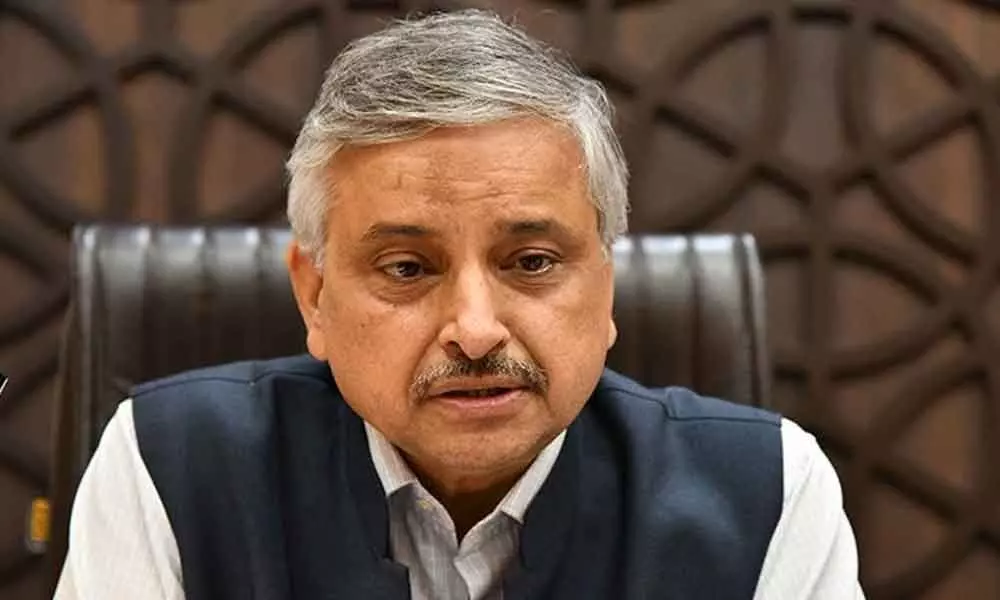Live
- Sai Durgha Tej gets special gift
- They always want me to win, and now I feel lucky to have been offered a story like ‘Zebra’: Satyadev Kancharana
- ‘Democracy first, humanity first’: PM Modi in Guyana's parliament on two countries' similarities
- PKL Season 11: Telugu Titans register third straight win to top standings
- Is Pollution Contributing to Your COPD?
- NASA Unveils Underwater Robots for Exploring Jupiter's Moons
- Additional Central forces arrive in violence-hit Manipur
- AR Rahman and Saira Banu’s Divorce: Legal Insights into Common Issues in Bollywood Marriages
- 82.7 pc work completed in HPCL Rajasthan Refinery area: official
- Curfew relaxation extended in 5 Manipur districts on Friday
Just In
Human-to-human transmission of bird flu rare, no need to panic


Randeep Guleria
Poultry workers must take precautionary measures, maintain personal hygiene: AIIMS chief
New Delhi: As the country reported the first confirmed case of human death due to Avian influenza, AIIMS chief Dr Randeep Guleria on Wednesday said that human-to-human transmission of the H5N1 virus is very rare and there is no need to panic. However, there is a need to do contact tracing and also take samples and look for any poultry deaths in the area from where the child who died due to the virus was residing, the AIIMS director told PTI.
A 12-year-old boy from Haryana, who was infected with the H5N1 virus, recently died at AIIMS Delhi. The National Institute of Virology, Pune had confirmed the infection, Dr Guelria said. "The transmission of the virus from birds to humans is rare and sustained human-to-human transmission of the H5N1 virus has not yet been established and therefore there is no need to panic. "But then people working closely with poultry must take precautionary measures and maintain proper personal hygiene," Dr Guleria said.
Dr Neeraj Nischal, an associate professor in the Department of Medicine at AIIMS, said Avian influenza or bird flu is predominately a zoonosis, and there is no evidence of sustained human-to-human transmission so far. "Although few isolated family clusters have been reported, transmission in these clusters may have occurred through common exposure and in rare situation a very close physical contact; there is no evidence of human-to-human transmission via small-particle aerosols," he said.
"Serologic surveys have not found evidence of asymptomatic infections among contacts of active cases and nosocomial transmission to healthcare workers has not been documented," Dr Nischal said. "There is no need to worry if one is eating properly cooked poultry products. There is no evidence so far that it can be spread to people through properly cooked food. The virus gets destroyed when the food is cooked at high temperature.
One should avoid contact with infected poultry, especially ill or dying chickens," he said. Dr Guleria said in the past when H5N1 avian flu influenza cases were reported from poultry, culling of poultry in those areas has been done to prevent the spread of infection and tackle it early.
The H5N1 is usually transmitted to poultry through migratory birds, he said. People who work in close contact with poultry are at high risk of getting the infection, Guleria added. An AIIMS source had said the 12-year-old boy was admitted to AIIMS on July 2 with pneumonia and leukaemia. He died on July 12. While undergoing treatment, tests for COVID-19 and influenza were conducted.
"His samples tested negative for COVID-19. It came out positive for influenza but was non-typable. It was sent to National Institute of Virology, Pune, where they confirmed it to be positive for H5N1 avian influenza," the source had said. Details of the case have been conveyed to the National Centre for Disease Control (NCDC) and their team has started surveillance and contact tracing and to see if there are any more cases with similar symptoms with whom the child has come in contact, sources said.

© 2024 Hyderabad Media House Limited/The Hans India. All rights reserved. Powered by hocalwire.com






